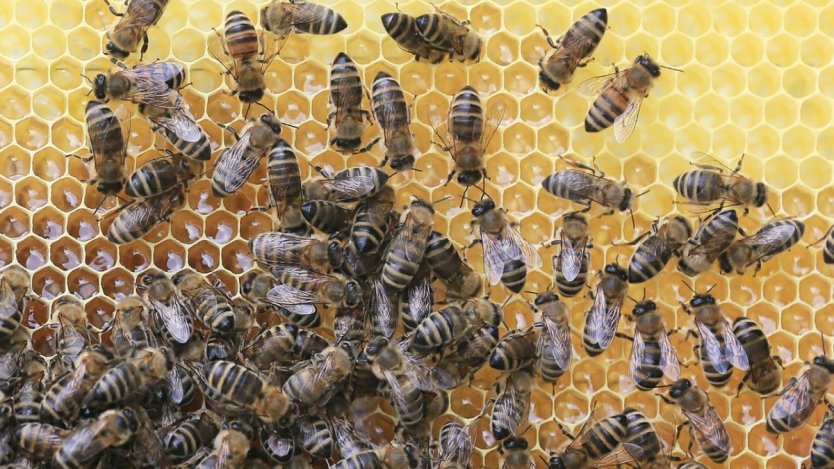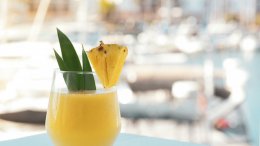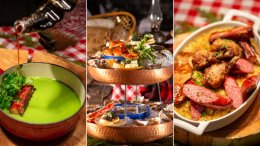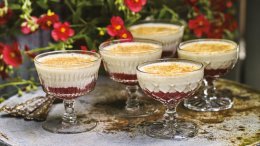While food and drink trends, customs and ingredients differ from coast to coast, one thing that every province and territory in Canada has in common is honey. With urban beekeeping on the rise and the plight of bees becoming commonplace knowledge, producers across the country are working hard to bring quality homegrown honey to Canadians and keep our environment healthy.
From working with propolis (a bee product with medicinal properties) to producing gourmet flavoured honey in tubes, and of course making mead, Canadian producers are not just harvesting honey and fostering bees, they are also innovating the applications of bee products in our daily lives.
British Columbia
B.C. is a hub of bee activity, with centres dedicated to helping others learn about bees and beekeeping, to producing mead and teas made with propolis. In Surrey, Honeybee Centre might as well be known as a bee headquarters, with its long list of services, products, expert knowledge and community involvement. After learning about beekeeping at Honeybee Centre, Vancouver resident Jonathan Piechnik started his own company, Propolis Tea. Straight out of high school, Piechnik began his company mixing propolis—an anti-inflammatory super food—with organic teas. On Vancouver Island, Tugwell Creek Honey Farm and Meadery make mead from the honey of bees who feed on a wild diet within 20 kilometres of the Tugwell farm. Keeping things small-batched and local makes this mead as sustainable as you can find.
Alberta
Alberta echos B.C. in its beekeeping knowledge, boutique honey products and quality mead. Currently, ABC Bees and its founder, Calgarian Eliese Watson, are known as pioneers in urban beekeeping. They focus on education and awareness, and work with local restaurant and businesses to bring local honey straight to the plates of Calgarians. Calgary is also home to Drizzle Honey, a boutique honey line, developed by former environmental scientist, Aja Horsley. Drizzle’s all-natural raw honey varies as it is harvested seasonally and from different locales. While this year’s summer version had heavy notes of floral blossoms, the spring version had notes of caramel. Drizzle’s honey is now found on shelves across the country. And, you can’t mention honey in Alberta without talking about Fallentimber Meadery, which will be celebrating its seventh year of operation on September 30. The honey used to make Fallentimber’s mead is harvested from the owner’s family farm and the fruits come from local Alberta producers. The result is a line of both still, hopped and carbonated meads made for all palates.
Saskatchewan
Leave it to Saskatchewan to find a new way to package honey and, of course, add Saskatoon berry flair. Tu-Bees produces unpasteurized honey in tubes gathered from hives in southern Saskatchewan. The idea came to founder Nicole Hein as a child, but the ball got rolling on Tu-Bees in 2007. The honey was recently featured in the gift bags at the Canadian Country Music Awards. With nine flavours, including Saskatoon berry, Tu-Bees’ products can be found online and at select retailers in Saskatchewan and Alberta.
Manitoba
Winnipeg’s Beeproject Apiaries are known as the city’s urban beekeeping experts. Started by Chris and Lindsay Kirouac, Beeproject brings honeybee hives to downtown Winnipeg rooftops. Organizations can submit applications to have hives installed, with Beeproject Apiaries doing all the work while delivering honey to you at the end of the season. Beeproject also sells its own honey—check out how honey varies in colour and taste from community to community—at shops and markets across Winnipeg.
Ontario
If you’re looking for a diverse array of bee goods, you can find a range in Ontario, from services that help you put hives in your backyard to a spa using honey-based beauty products. Toronto’s BEEGrrl Melanie Coates and chef David Garcelon were the first people to install a hive on top of a city hotel — The Fairmont Royal York. Because of their efforts, Fairmont Hotels around the world now operate their own apiaries. BEEGrrl honey and advice is available at its small hive on Dundas St. West.
Taking bee products to a new level is Beekeeper’s Naturals, which offers super foods made from bee products including propolis, bee pollen, raw honey and royal jelly. Using science and research, they formulate products to help you solve health woes while saving the bees. If you’re looking for an escape, head to Eco-Honey Bee Spa & Gardens in Kemptville, Ontario. The spa uses handcrafted bath and beauty products using herbs and honey from the gardens.
Quebec
Quebec’s beekeeping got a big boost in 1990 when three Canadian beekeepers joined forces and created Naturoney, which is now one of Canada’s biggest honey producers. Although it sources its honey from around the world (There are specific Canadian and Quebec varieties), Naturoney’s website allows you to track exactly where your honey comes from. For something a little more local, Alvéole, which operates in both Ontario and Quebec, is similar to Winnipeg’s Beeproject in that it offers hive setups at homes, businesses, schools and beekeeping classes. They are also a great source for beekeeping products and neighbourhood-based bespoke honeys. Quebec’s Miels d’Anicet also deserve a worthy mention as one of the province’s honey families. Since 1978, the Desrochers have been in the beekeeping business and now produce raw, unfiltered seasonal honeys, body products and mead.
New Brunswick
This year, New Brunswick is home to the Maritime Honey Festival. Being hosted in Fredericton September 22 to 23, this event is giving beekeepers from our country’s most Eastern provinces a chance to come together and share their knowledge. Locally, Fredericton is home to Marr’s Sweet Syrup. This small family-run company makes pure, raw honey, beeswax lip and body balms. You’ll see them featured on CBC’s Dragons’ Den this September.
Prince Edward Island
Canada’s smallest province has one of the most recognizable names in Canadian honey: Honibe. Founded by John and Susan Rowe, Honibe makes health products including vitamin gummies, supplements and lozenges using Prince Edward Island honey. Its award-winning products can be found in stores across the country. But if you’re in P.E.I., head to the north shore where you’ll find Drake Farms, a family-owned operation making wildflower, unpasteurized honey. Their pure P.E.I. honey, beeswax candles and bee pollen are sold at the farm (call ahead!) and local markets.
Nova Scotia
In Nova Scotia, the focus is on bee education. Haligonians are now able to rent urban beehives through Abbigail Honey to learn about bees and beekeeping. Renters then get a share of the honey produced. Youth in Halifax are being taught the importance of bees in our ecosystem and beekeeping basics through BEEA Honey With Heart, a program where 12- to17-year-olds manage hives and collect honey. The honey is then packaged and sold in the community and profits are reintegrated back into the program. Most recently, a workshop was held to teach participants how to turn honey into soap.
Newfoundland
G & M Family Farm, located in Freshwater Placentia Bay, is known as Newfoundland’s beekeeping experts. They’ve taken environmental challenges to beekeeping that are unique to the province and found ways around them, including instrumental insemination and a temperature controlled room for winter storage of the hives. Keen to help newbie beekeepers start their colonies, G & M Family Farm (which has been in operation for over 80 years) offers workshops and all the supplies needed to get a person started. Oh, and don’t forget their wildflower honey and honeycomb, available online.
Yukon
Northern Canada has a few beekeepers although its climate makes tending to hives a tough job. One producer attempting this task is Bee Whyld in Watson Lake. Operated by Courtney and Joel Wilkinson, Bee Whyld began in 2016 and specializes in Fireweed Honey, a honey known for its flavour and medicinal properties. After a few rough seasons, Bee Whyld is now producing both fireweed and wildflower raw honey from bees that pollinate in pesticide and non-GMO flowers.













